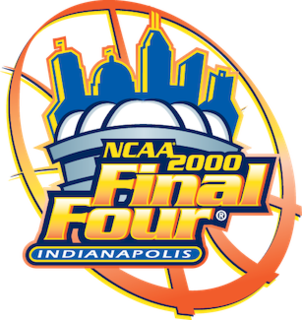Related Research Articles

The 2006 NCAA Division I men's basketball tournament involved 65 teams playing in a single-elimination tournament to determine the national champion of men's NCAA Division I college basketball as a culmination of the 2005–06 basketball season. It began on March 14, 2006, and concluded on April 3 at the RCA Dome in Indianapolis, Indiana.

The 2007 NCAA Division I men's basketball tournament involved 65 teams playing in a single-elimination tournament to determine the national champion of men's NCAA Division I college basketball as a culmination of the 2006–07 basketball season. Team selections were announced on March 11, 2007, and the tournament began on March 13, 2007, with the Opening round game and concluded with the championship game on April 2 at the Georgia Dome in Atlanta, Georgia.

The 2008 NCAA Division I Men's Basketball Tournament involved 65 schools playing in a single-elimination tournament to determine the national champion of men's NCAA Division I college basketball as a culmination of the 2007–08 basketball season. The 70th annual edition of the tournament began on March 18, 2008, and concluded on April 7 at the Alamodome in San Antonio.

The 1991 NCAA Division I Men's Basketball Tournament involved 64 schools playing in single-elimination play to determine the national champion of men's NCAA Division I college basketball. It began on March 14, 1991, and ended with the championship game on April 1 in Indianapolis, Indiana. A total of 63 games were played.

The 2000 NCAA Division I Men's Basketball Tournament involved 64 schools playing in single-elimination play to determine the national champion of men's NCAA Division I college basketball. It began on March 16, 2000, and ended with the championship game on April 3 in Indianapolis, Indiana at the RCA Dome. A total of 63 games were played.
The Virginia Cavaliers men's basketball team is the intercollegiate men's basketball program representing the University of Virginia. The school competes in the Atlantic Coast Conference in Division I of the National Collegiate Athletic Association. Virginia has won one NCAA Championship, two National Invitation Tournaments, and three ACC Tournament titles. The team is coached by Tony Bennett and plays home games at the on-campus John Paul Jones Arena (14,593) which opened in 2006. They have been called the Cavaliers since 1923, predating the Cleveland Cavaliers of the NBA by half a century.

The Florida Gators men's basketball team represents the University of Florida in the sport of basketball. The Gators compete in NCAA Division I's Southeastern Conference (SEC). Home games are played in the Exactech Arena at the Stephen C. O'Connell Center on the university's Gainesville, Florida campus.

The 1999–2000 Michigan State Spartans men's basketball team represented Michigan State University in the 1999–2000 NCAA Division I men's basketball season. The team played their home games at Breslin Center in East Lansing, Michigan. They were coached by Tom Izzo, in his fifth year as head coach, and were members of the Big Ten Conference. The Spartans finished the season 32–7, 13–3 to win a share of the Big Ten regular season championship for the third consecutive year. As the No. 2 seed in the Big Ten Tournament, they defeated Iowa, Wisconsin, and Illinois to win the tournament championship for the second consecutive year. As a result, they received the conference's automatic bid to the NCAA Tournament. As the No. 1 seed in the Midwest region (their second consecutive No. 1 seed, they defeated Valparaiso and Utah to advance to the Sweet Sixteen for the third consecutive year. They then defeated Syracuse and Iowa State to advance to the Final Four for the second consecutive year. After a win in the National Semifinal over fellow Big Ten foe Wisconsin, MSU won the National Championship over Florida. The win marked the school's second National Championship and Izzo's only championship to date.

The 1998–99 Michigan State Spartans men's basketball team represented Michigan State University in the 1998–99 NCAA Division I men's basketball season. The team played their home games at Breslin Center in East Lansing, Michigan and were coached by fourth-year head coach, Tom Izzo. The Spartans finished the season 33–5, 15–1 to win the Big Ten regular season championship. MSU defeated Northwestern, Wisconsin, and Illinois to win the Big Ten Tournament and receive the conference's automatic bid to the NCAA Tournament. As the No. 1 seed in the Midwest region, they defeated Mount Saint Mary's and Ole Miss to advance to their second straight Sweet Sixteen. In the Sweet Sixteen they defeated Oklahoma to advance to the school's first Elite Eight since 1979. In the Elite Eight, they defeated Kentucky to earn a trip to the Final Four for the first time since 1979. There they lost No. 1-ranked Duke. The 33 wins marked a school record for wins in a season.

The 2012 NCAA Division I Men's Basketball Tournament was a single-elimination tournament involving 68 schools playing to determine the national champion of men's NCAA Division I college basketball. The 74th edition of the tournament began on March 13, 2012, and concluded with the championship game on April 2 at the Mercedes-Benz Superdome in New Orleans.

The 2013–14 Duke Blue Devils men's basketball team represented Duke University during the 2013–14 NCAA Division I men's basketball season. They were led by thirty-fourth year and Hall of Fame head coach Mike Krzyzewski. They played its home games at Cameron Indoor Stadium in Durham, North Carolina as members of the Atlantic Coast Conference. They finished the season 26–9, 13–5 in ACC play to finish in a tie for third place. They advanced to the championship game of the ACC Tournament where they lost to Virginia. They received an at-large bid to the NCAA Tournament where they lost in the second round to Mercer.
This is a list of upsets by teams seeded 11 or higher that have occurred in the NCAA Division I Women's Basketball Tournament since the tournament expanded to 64 teams in 1994. In 2022 it expanded to 68 teams.

The 2018 NCAA Division I men's basketball tournament was a single-elimination tournament of 68 teams to determine the men's National Collegiate Athletic Association (NCAA) Division I college basketball national champion for the 2017–18 season. The 80th annual edition of the tournament began on March 13, 2018, and concluded with the championship game on April 2 at the Alamodome in San Antonio, Texas.

The 2021 NCAA Division I men's basketball tournament was a single-elimination tournament of 68 teams to determine the National Collegiate Athletic Association (NCAA) Division I men's college basketball national champion for the 2020–21 season. The 82nd edition of the tournament began play on March 18, 2021 in sites around the state of Indiana, and concluded with the championship game at Lucas Oil Stadium in Indianapolis on April 5, with the Baylor Bears defeating the previously undefeated Gonzaga Bulldogs 86–70 to earn the team's first ever title.

The 2022 NCAA Division I men's basketball tournament involved 68 teams playing in a single-elimination tournament that determined the National Collegiate Athletic Association (NCAA) Division I men's college basketball national champion for the 2021–22 season. The 83rd annual edition of the tournament began on March 15, 2022, and concluded with the championship game on April 4 at the Caesars Superdome in New Orleans, Louisiana, with the Kansas Jayhawks defeating the North Carolina Tar Heels, 72–69, to claim the school’s fourth national title.

The 2017–18 Virginia Cavaliers men's basketball team represented the University of Virginia during the 2017–18 NCAA Division I men's basketball season. The team was led by head coach Tony Bennett in his ninth year, and played their home games at John Paul Jones Arena in Charlottesville, Virginia as members of the Atlantic Coast Conference.
The 2017–18 Baylor Lady Bears basketball team represented Baylor University in the 2017–18 NCAA Division I women's basketball season. Returning as head coach was Hall of Famer Kim Mulkey for her 18th season. The team played its home games at the Ferrell Center in Waco, Texas and were members of the Big 12 Conference. They finished the season 33–2, 18–0 in Big 12 to win the Big 12 regular season title. They also won the Big 12 Women's Tournament and earned an automatic bid to the NCAA Women's Tournament where they defeated Grambling State and Michigan in the first and second rounds before getting upset by Oregon State in the sweet sixteen.

The 2018–19 Virginia Cavaliers men's basketball team represented the University of Virginia during the 2018–19 NCAA Division I men's basketball season. The team was led by head coach Tony Bennett in his tenth year, and played their home games at John Paul Jones Arena in Charlottesville, Virginia as members of the Atlantic Coast Conference.

On March 16, 2018, during the first round of the 2018 NCAA Division I Men's Basketball Tournament, the University of Virginia Cavaliers played a college basketball game against the University of Maryland, Baltimore County (UMBC) Retrievers at the Spectrum Center in Charlotte, North Carolina. The Cavaliers, who were seeded first in the South regional bracket and first overall in the NCAA Tournament, faced the Retrievers, who were seeded 16th in the South regional bracket. Virginia and UMBC competed for the right to face ninth-seeded Kansas State, which had already won their first-round game against Creighton earlier in the day.
References
- ↑ Thamel, Pete (March 22, 2021). "Why this may already be the craziest NCAA men's tournament ever". Yahoo Sports. Retrieved March 22, 2021.
- ↑ Wilco, Daniel (March 17, 2018). "Last perfect bracket busts after UMBC pulls off biggest upset in NCAA tournament history". NCAA.com. National Collegiate Athletic Association . Retrieved March 18, 2018.
UMBC (The University of Maryland Baltimore County) scored the biggest upset in the history of the NCAA tournament, beating top overall seed Virginia 74–54 Friday night, and becoming the first 16 seed to win a game in 136 tries.
- ↑ "NCAA tourney upsets match first-round record". ESPN.com. March 19, 2016. Retrieved March 20, 2018.
- ↑ Axson, Scooby. "Close calls for No. 1 seeds in NCAA Tournament". Sports Illustrated.
- ↑ Boone, Kyle (March 17, 2022). "March Madness 2022: Saint Peter's stuns Kentucky, No. 15 upsets No. 2 for 10th time in NCAA Tournament history". CBSSports.com . Retrieved March 17, 2022.
- 1 2 Lipscomb, Keith (March 17, 2019). "March Madness bracket facts for 2019 NCAA tournament". ESPN.com. Retrieved March 17, 2019.
- ↑ Bromberg, Nick (March 17, 2022). "NCAA tournament: No. 11 Michigan rides big second half to win over No. 6 Colorado State". Yahoo Sports. Retrieved March 17, 2022.
- ↑ "How No. 8 seeds do in March Madness". NCAA.com. February 5, 2021. Retrieved March 21, 2021.
Villanova remains the lowest seed to ever capture a national championship.